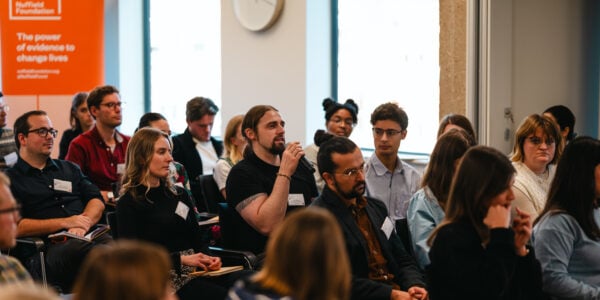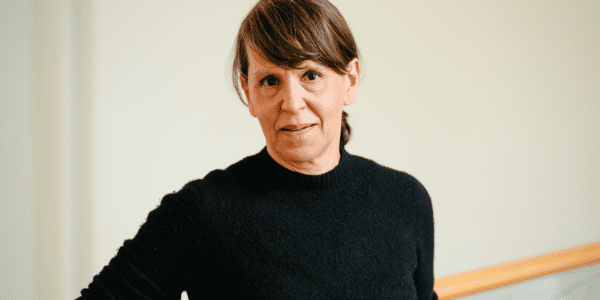What does it mean to be grown up in the UK today? Our new research project works with young people and our centres to explore this question.
In a rapidly changing world, the journey to adulthood has become prolonged and complex. We know that today’s young people are reaching the traditional markers of adulthood – finishing education, entering the workplace and leaving the family home – later than previous generations.
There are good reasons to suspect there’s more going on than simply the continuation of existing trends. However, evidence gaps remain in our understanding of young people’s lives. For example:
- lag-time for some data sources
- limited insight into how different digital technologies and artificial intelligence are used
- insufficient knowledge of how place affects opportunities
It’s time to ask: are we really talking about the same old generational divides or are young people today living through a distinct set of circumstances that warrant not just concern, but greater understanding and support?
Investigating the challenges and opportunities facing Gen Z
Generation Z (Gen Z) is the first to move into adulthood with smartphones in hand and under the lingering shadow of the COVID-19 pandemic. Persistent and often unforgiving headlines reveal a set of significant concerns about young people including:
- growing mental health difficulties
- job prospects and employability
- the potential scarring effects of COVID-19
- perceived harms from technology and living online
There are strengths worth recognising too. Unprecedented access to technology is creating new avenues for entrepreneurialism, as evidenced by a rise in ‘side hustles.’ Gen Z is more open about mental health and uses instant connectivity to build communities for a wide range of groups and interests.
So, what more do we need to know about young people’s lives, hopes, fears and experiences and what should society at large be doing differently?
Introducing Grown up? Journeys to adulthood
To address these questions, the Nuffield Foundation is launching Grown up? Journeys to adulthood. This new initiative focuses on the 8.6 million young people in the UK between the critical ages of 14 and 24 – a time when they face crucial decisions that shape their futures.
Grown up? will work with young people to understand when and how young people make key choices and investigate how the landscape of adulthood is evolving. As an exploratory programme, it aims to provide an overview of the key issues and debates across three themes, while identifying important questions that future research and innovative practice should address.
Key themes: education to work, digital lives, and mental health
The Grown up? programme comprises a phase of synthesis and engagement. It will focus on three interconnecting themes influencing when and how young people move into adult life:
- education to work
- digital lives,
- mental health and well-being.
We will examine our three themes through short data stories, think pieces that tackle contested topics and by listening to young people.
Grown up? takes a cross-cutting and multi-disciplinary approach, drawing on the expertise of Foundation colleagues at our three research centres: the Nuffield Family Justice Observatory (NFJO), Ada Lovelace Institute and Nuffield Council on Bioethics. For example, we are working closely with Ada to understand the interface between young people’s online and offline lives.
We hope that our findings and insights will inform future grant applications to the Nuffield Foundation to enable research, policy and practice to improve the policies and systems that impact young people’s lives.
Putting young people’s voices at the heart of Grown up?
A key focus of our work is listening to 14 to 24-year-olds from across the four nations, in cities and rural areas, and from a variety of backgrounds. We want to hear their insights and experiences to better understand how this most recent generation is managing and charting the course into adulthood.
Our goal is to capture shared and common experiences across this generation, as well as unpacking the differences and inequalities by group and by place. This could be, for example, the experiences of young people in social care who may be thrust prematurely into a more precarious adulthood. We also recognise the increasing divergence in youth policy across the UK, which provides valuable opportunities to learn and think in new ways.
Our commitment to young people’s well-being
The Nuffield Foundation has a long-standing interest in young people and their social well-being. Over the last 10 years, we’ve funded more than 100 grants covering this phase of life across education, justice and welfare, with a strong focus on the educational, employment and economic pathways and outcomes for young people. We also have a particular interest in addressing inequalities among young people, including the care system and the transitions of care leavers, the youth justice system and in relation to those with special educational needs and disabilities.
Watch this space
Grown up? will investigate the challenges and opportunities young people face, ensure their voices are heard, and strengthen the evidence base that underpins policy decisions affecting their lives. We are excited to be working with a brilliant group of young people to learn more about their lives. Researchers and practitioners in this field will contribute knowledge and experience and an expert advisory group will guide the programme.









